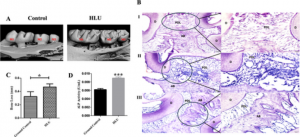Space conditions can cause gum inflammation and bone loss, say scientists
As space travel becomes a real possibility for longer missions, including journeys to Mars, scientists examine how space conditions affect human health.
SHARJAH, EMIRATE OF SHARJAH, UNITED ARAB EMIRATES, June 16, 2025 /EINPresswire.com/ -- Living in zero gravity can lead to periodontitis, a common and serious condition where the gums become inflamed and the bone that supports teeth starts to break down, eventually leading to tooth loss, scientists reveal in a new study.
The scientists confirm their findings in the study published in the journal of Periodontal Research, in which they try to understand how simulated microgravity—the near-weightless environment astronauts experience in space—might influence the development and severity of periodontitis. (https://doi.org/10.1111/jre.70000)
The researchers carried out their experiment in a lab in which mice were used to test the impact of periodontitis in microgravity conditions and on Earth. To simulate this, they use a special model where mice were placed in a position that mimics the effects of microgravity, and then gum disease was induced.
They write, “Six male C57BL/6J mice (3–4 months, ~30 g) were randomly divided into two groups (n=3 each): (a) ground control with ligature-induced periodontitis and (b) hindlimb unloaded with ligature-induced periodontitis.
“All procedures followed ethical approval (ACUC-02-02-2023). Mice were anesthetized (100mg/ kg ketamine/5–10mg/kg xylazine, intraperitoneally) prior to ligature placement between the first and second left maxillary molars.”
The study, according to lead author Zahi Badran, University of Sharjah’s professor of periodontology, has “found that mice exposed to simulated microgravity showed much worse gum inflammation and bone loss compared to mice with induced periodontitis on the ground. They had higher levels of disease markers, more severe tissue damage, and more immune cells in the affected areas.”
The group of mice on the ground “showed minimal bone loss,” while the group in simulated space conditions “exhibited a marked increase in CEJ-ABC distance, indicating significant bone resorption.”
Similarly, the group of mice in simulated space fight “displayed a significant increase in ALP activity compared to the control group, indicating increased bone resorption and inflammation associated with periodontitis due to the change in gravity,” the researchers find.
The researchers use ALP, or Alkaline Phosphatase activity, as a marker for several biological processes, most notably bone growth and liver function.
The research indicates that microgravity can exacerbate induced gum disease in animals, underscoring the importance of developing tailored dental prophylaxis and care strategies for future space explorers. “It also opens the door to better understanding how inflammation works in the body, both in space and on Earth,” adds Prof. Badran.
As space travel becomes a real possibility for longer missions, including journeys to Mars, scientists are looking more closely at how space conditions affect human health. However, the authors maintain that one area that’s been less studied is oral health and diseases in microgravity, especially gum disease, also known as periodontitis.
The authors stress the fact that there has been “an increased interest in astronauts or future space health, especially the effects of microgravity on various body systems.”
However, they note that “to the best of our knowledge, this is the first in vivo pilot study to investigate microgravity's effects on periodontitis progression using the combination of the hindlimb unloading.”
Asked about the significance of the research findings for space agencies, Prof. said the study “calls for the integration of dental medicine, particularly periodontology, into astronaut/future space colonies' inhabitants' health protocols.
“Specialized prevention and treatment strategies, along with in-mission monitoring tools, most probably will be essential in case of prolonged space stays. Simultaneously, the model offers terrestrial benefits, providing insights into the periodontal status of immobilized bed patients, who experience similar effects of microgravity.
“This model will be extensively studied to better understand the biological pathways underlying these outcomes and to explore how periodontitis may influence other systemic diseases under microgravity.”
The authors see their study as a harbinger of “a new line of multidisciplinary research on oral health and disease in microgravity” that will shed more light on space medicine in general.
They say they are determined to replicate their model “to assess additional microbiological and immunological parameters to investigate the connection between gum diseases and other systemic diseases in microgravity.”
The authors are aware of the limitations of their study, as its findings are based on a relatively small sample size. However, they emphasize its robustness due to the use of “the HLU model to simulate microgravity, which offers valuable insights into disease progression under space-like conditions.”
LEON BARKHO
University Of Sharjah
+971 50 165 4376
email us here
Legal Disclaimer:
EIN Presswire provides this news content "as is" without warranty of any kind. We do not accept any responsibility or liability for the accuracy, content, images, videos, licenses, completeness, legality, or reliability of the information contained in this article. If you have any complaints or copyright issues related to this article, kindly contact the author above.

